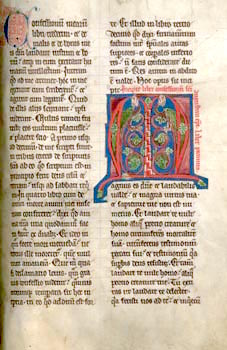Related Research Articles

Allah is the common Arabic word for God. In the English language, the word generally refers to God in Islam. The word is thought to be derived by contraction from al-ilāh, which means "the god", and is linguistically related to the Aramaic words Elah and Syriac ܐܲܠܵܗܵܐ (ʼAlāhā) and the Hebrew word El (Elohim) for God.

In ancient Greek religion and mythology, Pan is the god of the wild, shepherds and flocks, rustic music and impromptus, and companion of the nymphs. He has the hindquarters, legs, and horns of a goat, in the same manner as a faun or satyr. With his homeland in rustic Arcadia, he is also recognized as the god of fields, groves, wooded glens, and often affiliated with sex; because of this, Pan is connected to fertility and the season of spring.

The ichthys or ichthus, from the Greek ikhthū́s is a symbol consisting of two intersecting arcs, the ends of the right side extending beyond the meeting point so as to resemble the profile of a fish. It has been speculated that the symbol was adopted by early Christians as a secret symbol; a shibboleth to determine if another was indeed Christian. It is now known colloquially as the "Jesus fish".
Ichthus may refer to:

Eric Steven Lander is an American mathematician and geneticist who is a professor of biology at the Massachusetts Institute of Technology (MIT), and a professor of systems biology at Harvard Medical School. Eric Lander is founding director emeritus of the Broad Institute of MIT and Harvard.

Confessions is an autobiographical work by Augustine of Hippo, consisting of 13 books written in Latin between AD 397 and 400. The work outlines Augustine's sinful youth and his conversion to Christianity. Modern English translations of it are sometimes published under the title The Confessions of Saint Augustine in order to distinguish the book from other books with similar titles. Its original title was Confessions in Thirteen Books, and it was composed to be read out loud with each book being a complete unit.

The fall of man, the fall of Adam, or simply the Fall, is a term used in Christianity to describe the transition of the first man and woman from a state of innocent obedience to God to a state of guilty disobedience. The doctrine of the Fall comes from a biblical interpretation of Genesis, chapters 1–3. At first, Adam and Eve lived with God in the Garden of Eden, but the serpent tempted them into eating the fruit from the tree of knowledge of good and evil, which God had forbidden. After doing so, they became ashamed of their nakedness and God expelled them from the Garden to prevent them from eating the fruit of the tree of life and becoming immortal.

Nicholas Paul Wolterstorff is an American philosopher and theologian. He is currently Noah Porter Professor Emeritus of Philosophical Theology at Yale University. A prolific writer with wide-ranging philosophical and theological interests, he has written books on aesthetics, epistemology, political philosophy, philosophy of religion, metaphysics, and philosophy of education. In Faith and Rationality, Wolterstorff, Alvin Plantinga, and William Alston developed and expanded upon a view of religious epistemology that has come to be known as Reformed epistemology. He also helped to establish the journal Faith and Philosophy and the Society of Christian Philosophers.

Peter John Kreeft is a professor of philosophy at Boston College and The King's College. A convert to Roman Catholicism, he is the author of over eighty books on Christian philosophy, theology and apologetics. He also formulated, together with Ronald K. Tacelli, Twenty Arguments for the Existence of God in their Handbook of Christian Apologetics.

Creatio ex nihilo is the doctrine that matter is not eternal but had to be created by some divine creative act. It is a theistic answer to the question of how the universe came to exist. It is in contrast to Ex nihilo nihil fit or "nothing comes from nothing", which means that all things were formed ex materia from preexisting things; an idea by the Greek philosopher Parmenides about the nature of all things, and later more formally stated by Titus Lucretius Carus.
The idea of corporate election expresses a Christian soteriological view that understands Christian salvation as based on "God choosing in Christ a people whom he destines to be holy and blameless in his sight". Put another way, "Election is the corporate choice of the church 'in Christ.'" Paul Marston and Roger Forster state that the "central idea in the election of the church may be seen from Ephesians 1:4": "For he [God] chose us [the Church] in him [Christ], before the creation of the world to be holy and blameless in his sight." William Klein adds:
Here [in Ephesians 1:3-4] Paul states that God chose Christians in Christ before the creation of the world to be holy and blameless in his sight. The "chosen ones" designate the corporate group to whom Paul writes with himself included: God chose us. The focus is not on the selection of individuals, but the group of those chosen. As Westcott notes, "He chose us for Himself out of the world." Paul specifies the timing of this choice—it was pretemporal, before the world was created. God made the choice "in him". In other words, Christ is the principal elected one, and God has chosen a corporate body to be included in him."

Ronald Leslie Numbers was an American historian of science. He was awarded the 2008 George Sarton Medal by the History of Science Society for "a lifetime of exceptional scholarly achievement by a distinguished scholar".

Within the Christian tradition, bridal theology, also referred to as mystical marriage, is the New Testament portrayal of communion with Jesus as a marriage, and God's reign as a wedding banquet. This tradition in turn traces back to the Hebrew Bible, especially allegorical interpretations of the erotic Song of Songs.

The Veritas Forum is a non-profit organization that works with Christian students on college campuses to host forums centered on the exploration of truth and its relevancy in human life, through the questions of philosophy, religion, science, and other disciplines. The organization, named after the Latin word for truth, aims to "create university events engaging students and faculty in exploring life's hardest questions and the relevance of Jesus Christ to all of life." The first Veritas Forum was held at Harvard University in 1992. By 2008, 300,000 students had attended over 300 forums at 100 campuses across the US, Canada, France, England, and the Netherlands. In the 2010–2011 academic year, Veritas Forums were held at over 50 institutions of higher education. Veritas Forums are available for viewing online, and the organization has published several books with InterVarsity Press.
Ichthus Christian Fellowship is a neocharismatic Christian church movement and Apostolic network based in London, United Kingdom. It is part of the British New Church Movement (BNCM) and has links with other BNCM leaders and movements, especially Gerald Coates of Pioneer Network.

Roger Thomas Forster was a British Christian theologian who was the founder of Ichthus Christian Fellowship, a neocharismatic Evangelical Christian Church that forms part of the British New Church Movement.
God's Country Radio Network was a Religious broadcasting radio network in the United States which launched in 2008. The majority of stations that the network aired on were owned by the non-profit organization Educational Media Foundation, though it also aired on some independent stations. God's Country Radio Network played a blend of Southern Gospel and Positive Country music.
Dominic D. P. Johnson is an Alistair Buchan Professor of International Relations at St Antony's College, Oxford.
Jesuism or Jesusism is a belief system considering itself to be the true representation of the teachings of Jesus and contrasts itself from the teachings of mainstream Christianity. In particular, the term is often contrasted with Pauline Christianity and the mainstream church dogma of Nicene Christianity.

Creation Festival, commonly shortened to Creation, was an annual four-day Christian music festival in the United States. According to its organizers, it was the "Nation's Largest Christian Music Festival." Average attendance was between 50,000 and 100,000 annually. In late March 2023, the festival's website included a pop-up window announcing the end of the longstanding event, thanking all who had taken part, and providing statistics on the number of people affected over the years. Ticket holders were promised refunds and launch of a "New Vision for 2024" was mentioned.
References
- ↑ </ Student organizations
- ↑ When I first met Bonhoeffer
- ↑ Learning to leave college
- ↑ The Fish Tank
- ↑ Beginnings are always exciting
- ↑ "About the Ichthus". The Harvard Ichthus. Retrieved 2021-03-13.